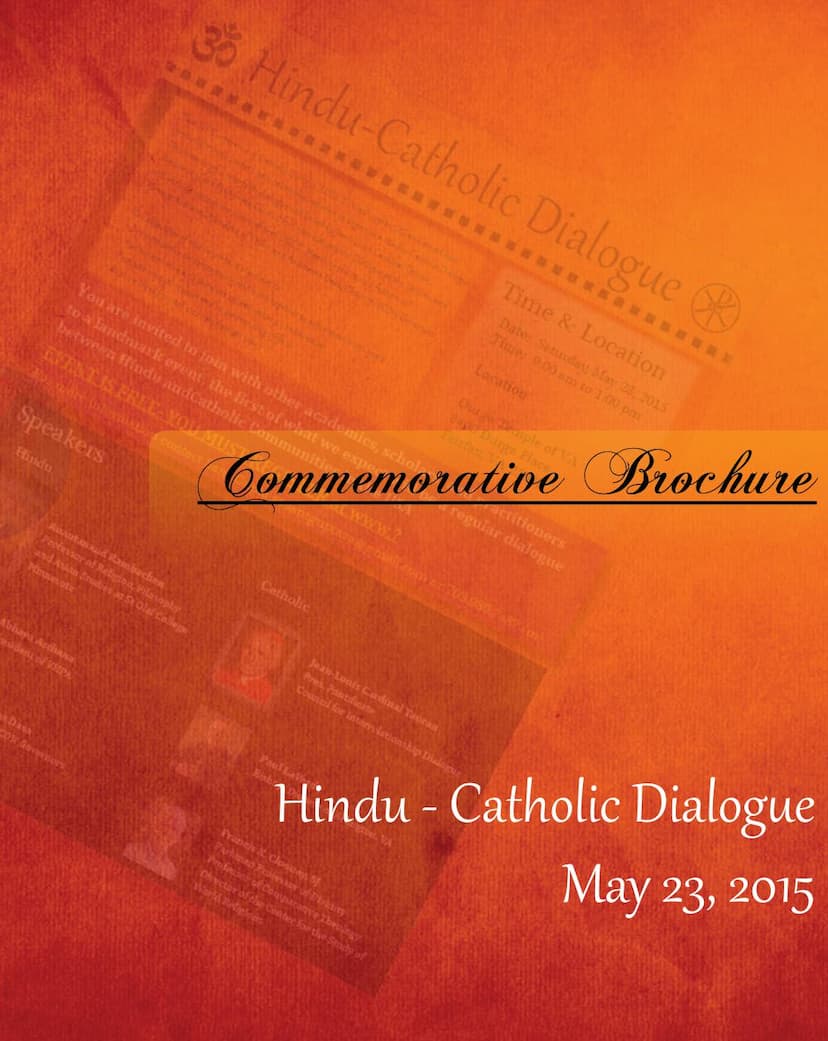Hindu Catholic Dialogue Commemorative Brochure 20150523
Added to library: September 1, 2025
Loading image...

Summary
This commemorative brochure documents the Hindu-Catholic Dialogue held on May 23, 2015, at the Durga Temple in Fairfax Station, Virginia. It serves as a guide and record of this interfaith meeting, highlighting the shared values and theological reasons for mutual respect between the two religious traditions.
Key Themes and Content:
- Purpose of the Dialogue: The brochure emphasizes the importance of interreligious dialogue for fostering understanding, mutual esteem, and collaboration. It marks a step in building stronger relationships between Hindus and Catholics, a process that has seen growth in recent decades, particularly following Vatican II's declaration Nostra Aetate.
- Hindu Perspectives:
- Core Teachings: Hinduism is described as a path to connect with the Divine within, emphasizing the inherent divinity in all beings. It is characterized by respect for diverse viewpoints, a focus on Dharma (right conduct) rather than dogma, and the principles of Karma.
- Values: Core Hindu values include love, compassion, service, respect for the earth, minimizing violence, and the welfare of all. This is exemplified by the song of Narsin Mehta, which describes a true devotee as one who understands the pain of others, does good without pride, and tolerates and praises the world.
- Key Figures: Swami Vivekananda's quote on tolerance and universal acceptance is highlighted, emphasizing the belief that all religions lead to the same goal. The brochure also introduces prominent Hindu speakers and organizations involved, such as Dr. Anantanand Rambachan, Dr. D.C. Rao, Anuttama Dasa, and the World Hindu Council of America (VHPA).
- Theological Basis for Respect: Hinduism's understanding of the all-pervasiveness of the Divine and the concept that "Truth is One, although wise persons speak of It in various ways" (Rig Veda) forms a foundation for mutual respect. The teaching that "God exists equally in all beings" reinforces the dignity and sacred worth of every human being.
- Catholic Perspectives:
- Core Teachings: Catholicism traces its heritage to the apostles and believes in the abiding presence of the Holy Spirit. Its foundation is in Scripture and Tradition, with Jesus Christ as the central figure.
- Values: Core Catholic ethical teachings are based on the love of God and neighbor, as exemplified in the Sermon on the Mount. The Church emphasizes solidarity, community, justice, and stewardship of creation.
- Key Figures: The brochure introduces Catholic participants such as Cardinal Jean-Louis Tauran and Bishop Paul S. Loverde, and organizations like the U.S. Conference of Catholic Bishops (USCCB) and the Archdiocese of Washington. Rev. Francis X. Clooney, S.J. offers insights into comparative theology.
- Theological Basis for Respect: Vatican II's Nostra Aetate is a cornerstone, stating that the Church "rejects nothing that is true and holy" in other religions and regards their ways of conduct and life as reflecting a "ray of that Truth which enlightens all men." Catholicism recognizes that God works in the lives of devout Hindus and sees dialogue as a spiritual opportunity. The belief that "God is one; we are all the children of God" and that "God wills the salvation and well-being of all" provides a basis for engagement.
- Dialogue and Common Ground: Both traditions acknowledge the importance of humility, the ineffability of the Divine, and the inherent dignity of the human person. They find common ground in their commitment to spiritual renewal, the pursuit of justice, and the shared desire for peace and the common good. Both traditions value contemplative paths, celebrate the divine presence in nature, and engage in elaborate worship practices involving sacred spaces, rituals, and symbols.
- Program of the Dialogue: The schedule outlines a day of registration, welcoming remarks, opening prayers, keynote addresses by Hindu and Catholic scholars, remarks from dignitaries, and the honoring of guests.
- Supporting Organizations: The brochure lists various Hindu organizations, including Durga Temple, Hindu American Community Services Inc. (HACSI), Hindu American Foundation (HAF), Hindu Mandir Executives' Conference (HMEC), Vishva Hindu Parishad of America (VHPA), Hindu American Seva Communities (HASC), India International School, and ISKCON, as well as Catholic entities like the Archdiocese of Washington, the Catholic Diocese of Arlington, and the Catholic Association of Diocesan Ecumenical and Interreligious Officers. These organizations demonstrate the vibrant community engagement and interfaith activism present.
- Misconceptions Addressed: The brochure addresses common misconceptions, such as the caste system being an inherent part of Hindu scriptures, the notion of Abrahamic religions being exclusively monotheistic, and Hinduism being fatalistic regarding karma. For Catholicism, it clarifies misconceptions about the veneration of Mary and the defense of human life.
In essence, the brochure provides a detailed overview of the Hindu-Catholic Dialogue, emphasizing shared values, theological foundations for mutual respect, and the ongoing commitment to interfaith understanding and cooperation between these two major world religions.